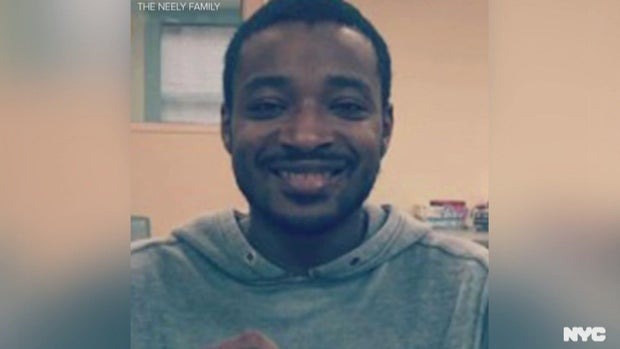NEW YORK — Daniel Penny has been found not guilty of criminally negligent homicide in the chokehold death of Jordan Neely on a New York City subway car in 2023.
Penny, a 26-year-old Marine veteran, pleaded not guilty to charges of second-degree manslaughter and criminally negligent homicide.
The judge dismissed the manslaughter charge on Friday after jurors said they could not come to a unanimous decision. The jury could only consider the negligent homicide charge if Penny was cleared of manslaughter.
Word of the verdict came after jurors deliberated for more than 20 hours. Penny appeared to smile, as his attorneys hugged each other.
“We couldn’t be more pleased that a jury of Danny’s peers acquitted him of any wrongdoing. And now New Yorkers can take some comfort in knowing that we can continue to stand up for one another without sacrificing our rights or our freedoms,” his lawyers said in a statement.
Kenniffthelawyer/Instagram
His attorneys later shared a photo on social media showing them raise a glass at a bar after the verdict.
CBS News New York’s Alice Gainer was inside the courtroom when the decision came down. She reported it was chaos, as some cheered in support of Penny, and Neely’s father, Andre Zachery, had to leave the room because he stood up and was heard swearing.
Penny faced a maximum possible sentence of 15 years in prison on the manslaughter charge, or four years on the negligent homicide charge. There was no minimum sentence.
Protests outside courthouse over Daniel Penny verdict
Dozens of protesters lined up outside the courthouse Monday, chanting “Justice for Jordan Neely!” Inside, Penny’s defense team asked for a mistrial and once again was denied.
The defense also raised concerns that jurors could potentially hear some of what the demonstrators were saying. They said the demonstrators were using megaphones and bullhorns, chanting things like, “Murdered!” and “Subway strangler!”
The judge agreed he also heard the commotion and reminded the jury to ignore things they may hear or read about the case.
Zachery told CBS News New York, “My son didn’t have to go through this. I didn’t have to go through this, either. It hurts. It really, really hurts,” adding, “What’s going to happen to us now? Had enough of this. System is rigged. Come on, people. Let’s do something about this.”
One activist who had been outside demonstrating every morning was inside and yelled something at Penny along the lines of “It’s a small world, buddy.”
“Our call to action is to take care of each other. We can’t rely on outside people. If we see someone asking for food, we have to take the responsibility to give it to them. If we see someone cold, to give them a coat. If we see someone going through something, to ask them if they’re OK,” Donte Mills, attorney for the Neely family, said during a news conference outside the courthouse. “That’s how we help each other, because we can’t rely on the system to do it for us.”
Eric Garner’s mother, Gwen Carr, also spoke outside the courthouse, saying, “No one deserves to be choked to death,” adding, “I tell this family, do not give up, because that’s what they want you to do. They want to discourage you, just like they tried to discourage me. Ten years later, I’m still fighting.”
The Rev. Al Sharpton, who spoke at Neely’s funeral, put out a statement, which read, in part, “This verdict represents the blatant legalization of civilian vigilantism, sending a dangerous message that citizens can now take matters into their own hands, even if it leads to someone’s death.”
“It was foolish of us to think that a Black man would get justice in a system that is designed to keep him oppressed,” added Chivona Newsome, co-founder of Black Lives Matter Greater New York.
Manhattan district attorney responds with statement
The verdict drew praise from Vice President-elect JD Vance and New York Congressman Mike Lawler, who both criticized Manhattan District Attorney Alvin Bragg for prosecuting Penny.
Bragg released a statement following the verdict, saying:
“As with every case, we followed the facts and the evidence from beginning to end. A Grand Jury voted to indict, and the Office carefully presented this case to a trial jury.
“Over the course of the trial, we introduced medical records, videos, bodycam footage, and testimony from over 30 witnesses, including from the City’s Office of the Chief Medical Examiner.
“The jury carefully deliberated for four days. They requested readbacks of testimony and asked for video footage to re-watch, as well as written definitions of the law. Their lengthy deliberation – and the totality of the facts and the evidence — underscored why this case was put in front of a jury of Mr. Penny’s peers.
“The jury has now spoken. At the Manhattan D.A.’s Office we deeply respect the jury process and we respect their verdict.
“Unfortunately, over the duration of this trial, talented career prosecutors and their family members were besieged with hate and threats — on social media, by phone and over email. Simply put, this is unacceptable, and everyone, no matter your opinion on this case, should condemn it. These are prosecutors who have dedicated decades of their lives to public service and to the safety of Manhattan. I am grateful to them, as well as to the NYPD for their hard work and commitment on not only this matter, but for all they do on behalf of New Yorkers. I also want to thank Judge Wiley for presiding over this case. Finally, I want to thank the members of the jury who took time out of their lives to diligently evaluate the evidence.”
NYC mayor responds to the verdict
Mayor Eric Adams was asked by reporters if he thinks the verdict says anything about the mood of the city, and if he feels like it could open the door for maybe more of these interactions of people exacting their own justice.
“Good question. And I’ll answer the latter first. Of what you see, of what people often do, a lot of people make interpretations, you know, about trials, but juries are in the courtroom. They’re hearing every piece of evidence, they are hearing the testimonies. They have to make the decision. And that’s the system that we have. And actually, it is probably one of the best systems on the globe. And I think the jury’s heard the evidence and made a determination based on the evidence that they heard. And the … does it impact what’s going to happen throughout the city that people are not going to take action or going to take action? I don’t think it does.
“I think that oftentimes people make these decisions when they are in the midst of it. And there’s a desire of New Yorkers to help out those who are in need. There’s a desire of New Yorkers is to always respond when they believe it’s necessary. And I don’t think that is going to change in any way. This is not the first time, and I’m sure it’s not going to be the last time that individuals take actions and people are going to question about those actions that happened.
“But at the cornerstone and at the heart of this is that, of this young man, like so many others that are on our subway systems, I made it clear that’s not a place to sleep, to live. That’s not a place to be. And when they need help, we need to give them the help of that they have.”
About the charges
In order to be convicted of manslaughter, prosecutors had to prove:
- Penny caused Neely’s death
- That he did so recklessly
- That he was not justified
In order to be convicted of criminally negligent homicide, prosecutors had to prove:
- Penny caused Neely’s death
- That he did so with criminal negligence
- That he was not justified
The death of Jordan Neely
Police and witnesses said Neely, 30, boarded an F train in SoHo on May 1, 2023 and began shouting, throwing things and making threats. Penny, a passenger on the train, approached Neely from behind and tried to restrain him.
Video shows Penny holding Neely in a chokehold on the floor of the train for several minutes until Neely stopped moving. After police arrived, officers administered Narcan to Neely, performed CPR and used an AED, but were unable to revive him. Neely was pronounced dead at the scene.
Police said Neely did not have any weapons on him.
The Neely Family
A medical examiner ruled Neely’s death a homicide three days later, with the cause as compression of the neck. Toxicology reports showed Neely had synthetic marijuana in his system when he died.
Neely was a street performer and Michael Jackson impersonator who was experiencing homelessness and had struggled with mental illness after his mother was murdered in 2007.
Video of Penny holding Neely in the chokehold was widely circulated online. Neely’s death sparked protests across New York City, with many raising concerns about the need for better mental health care in the city, and Neely’s family called for Penny’s arrest.
Penny turned himself in on May 12, 2023, and was initially charged with second-degree manslaughter and released on $100,000 bail. He was arraigned in June and pleaded not guilty to criminally negligent homicide and second-degree manslaughter.
Penny defended his actions, saying he was trying to protect other passengers on the train by restraining Neely.
NYC subway chokehold death trial
In late October 2024, a 12-person jury and four alternates were selected and sworn in. They included seven women and five men, with at least seven White people, one Hispanic person, one Filipino person, one Black person and one person of Middle Eastern descent.
The trial began Nov. 1.
The prosecution argued in their opening statements that Penny, though he had good intentions, recklessly used excessive force without trying any other means of deescalating the situation. The defense, meanwhile, argued Penny was protecting other passengers and there was no other way to deescalate due to Neely’s behavior.
Jurors heard testimony from multiple witnesses, including police officers, MTA employees, passengers on the train and a bystander who helped Penny restrain Neely. Penny’s Marine Corps martial arts instructor and the medical examiner who performed Neely’s autopsy also took the stand. The defense called Penny’s mother and platoon sergeants as character witnesses, along with a forensic pathologist who said he disagreed with the medical examiner’s cause of death.
Jurors began their deliberations last Tuesday. They sent two notes back to the judge. The first requested a readback of part of the judge’s instructions. The second note asked the judge if they could return for deliberations Wednesday, which is a day they would normally have had off. The judge approved that request.
Wednesday morning, jurors sent another note, asking to see a video compilation of police bodycams from the incident, as well as footage of Penny’s police station interview. Jurors also asked for readback of the medical examiner’s cross-examination.
Friday morning, on the fourth day of deliberations, they sent a note to the judge indicating they couldn’t reach a unanimous verdict on his manslaughter charge.


